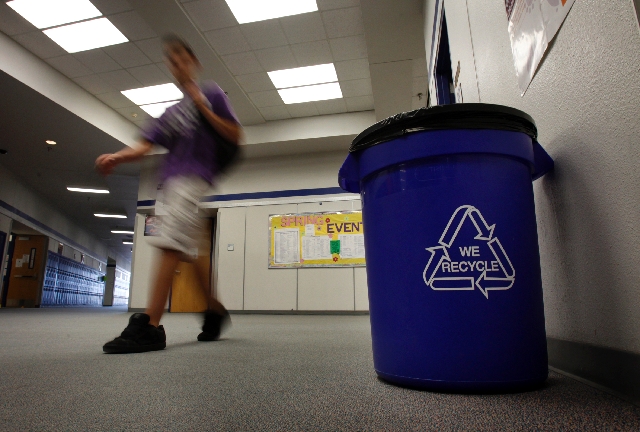Recycling effort transforms Liberty High School’s trash

Garbage thrown away last school year at Liberty High School would fill an Olympic-sized swimming pool more than 6 feet deep.
At the time, recycling consisted of little more than janitors sifting through classroom trash cans at the end of the day for aluminum cans, plastic bottles and such, as is the practice at more than 350 Clark County School District campuses.
But a small group of Liberty students decided in October to take responsibility for recycling at their Henderson school. Since then, less than half as much waste has been trucked to the landfill, allowing the school to get rid of one of its two industrial-size garbage bins. And the garbage truck now comes five days a week instead of six.
Now, the school’s recycling — not its trash — is enough to fill an Olympic-sized swimming pool over the course of an academic year.
The shift isn’t due to a district mandate, but to an Eco Club of 60 students that placed recycle bins next to every trash can in the school and even at the football field. The club also started a school-wide recycling campaign, said club officer and senior Samantha Banz, who plans to attend the University of Nevada, Las Vegas. Even after she graduates, she said she’ll remain involved in her school’s recycling efforts and that of other Henderson schools planning to make the same changes.
She’ll be among the district’s first class of green ambassadors under a new pilot program announced Tuesday at Basic High School, another Henderson school where students saw a lack of recycling and reacted.
Basic, opened 70 years ago, is the second-oldest school in the valley, “but we’re young enough to change our ways,” said Principal David Bechtel, who was on board the instant Eco Club students presented their aggressive recycling plan.
Green ambassadors will advise students at Basic and other Henderson high schools on how to create and manage recycling programs at their campuses. These student recycling programs could save the district $1 million in the inaugural year if new eco clubs get students to pay attention to the blue bins, said Associate Superintendent of Facilities Paul Gerner.
“There’s no greater motivator to change your behavior than a student on a mission,” said Gerner, noting the effect on not just students but school staff and parents.
School savings are achieved by less need for garbage collectors, who charge more for trash pickups than recycling, he said.
The district started recycling in the 2009-10 school year and through minimal effort saved $1.2 million that year. It saved $2.3 million the next year, and the savings probably would’ve increased in 2011-12. However, a surge of garbage last school year offset any recycling savings, and the district actually increased it garbage costs by $230,000, Gerner said.
The surge was caused by former Superintendent Dwight Jones mandating that 36 elementary schools with high poverty rates make breakfast part of the school day. With the district receiving full reimbursement for every poor child who ate school breakfast, the district required all children to take breakfast, but program rules don’t allow food to be saved, meaning much ends up in garbage cans.
Katie Duffy, district recycling specialist, took applications Tuesday for green ambassadors, who must be in seventh through 12th grade. A retreat will be held in June to start student-led recycling programs at all Henderson schools, she said.
That’s about 60 campuses, including elementary schools where just milk cartons would be recycled, Duffy said. It’s just Henderson for now because of a partnership with the city, officials said.
And Basic is only getting started, said Eco Club Co-President Jayden Al-Fokaiki.